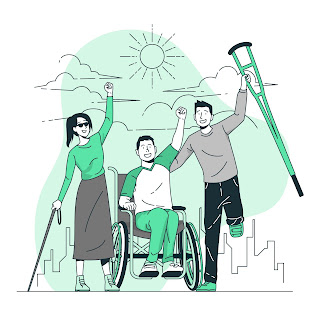In a society that values diversity and equity, ensuring the rights of every individual, regardless of their abilities, is paramount. Recognizing this fundamental principle, India took a significant stride towards inclusivity with the enactment of the Rights of Persons with Disabilities Act, 2016. This transformative legislation marks a watershed moment in the country's commitment to fostering a more accessible, equitable, and just society for all its citizens.
Historical Context and Purpose:
The journey towards recognizing the rights of persons with disabilities in India has been evolutionary. The 1995 Persons with Disabilities (Equal Opportunities, Protection of Rights, and Full Participation) Act was a significant milestone in this regard, but it became apparent that a comprehensive and updated framework was necessary to address the evolving needs of the disabled population. In line with the United Nations Convention on the Rights of Persons with Disabilities (UNCRPD), which India ratified in 2007, the 2016 Act aimed to create a more robust legal foundation for safeguarding the rights of individuals with disabilities.
Salient Features of the Act:
1. Expanded Definitions: The Act significantly expanded the definition of disabilities from seven to twenty-one, encompassing physical, intellectual, sensory, and mental impairments. This expansion acknowledged the diverse spectrum of disabilities and the need for tailored support.
2. Non-Discrimination and Equality: The Act firmly established the principle of non-discrimination, ensuring that persons with disabilities are not denied their rights and opportunities due to their disabilities. It demands equal access to education, healthcare, employment, and public spaces.
3. Accessibility: Emphasizing the significance of accessibility, the Act mandates the creation of barrier-free environments. New constructions are required to adhere to accessibility standards, enabling persons with disabilities to move freely and independently.
4. Reservation and Empowerment: The Act introduces provisions for 4% reservation in government jobs and educational institutions for persons with disabilities. This affirmative action aims to bridge the socio-economic gap and provide equal opportunities for professional growth and education.
5. Inclusive Education: The Act advocates inclusive education, ensuring that educational institutions offer reasonable accommodations for students with disabilities. This provision promotes learning environments that cater to diverse learning needs.
6. Guardianship and Legal Capacity: It recognizes the legal capacity of persons with disabilities and introduces the concept of "limited guardianship" to prevent undue restrictions on their rights.
7. National and State Commissions: The establishment of the National Commission for Persons with Disabilities and State Commissions facilitates monitoring, enforcement, and addressing grievances related to the rights of persons with disabilities.
Impact and Challenges:
The enactment of the 2016 Act has had a profound impact on the lives of persons with disabilities, ushering in a renewed sense of dignity, empowerment, and inclusion. Access to education, employment, and public spaces has become more feasible, and societal attitudes have gradually shifted towards greater acceptance. However, challenges persist in the form of awareness gaps, implementation bottlenecks, and attitudinal barriers that impede the full realization of the Act's objectives.
Conclusion:
The Rights of Persons with Disabilities Act, 2016, embodies India's dedication to creating a just and inclusive society that recognizes and respects the rights of all its citizens, irrespective of their abilities. By providing a comprehensive legal framework that addresses various dimensions of disability rights, the Act has set the stage for a more equitable future. To fully realize its transformative potential, sustained efforts from the government, civil society, and individuals are necessary. This Act not only champions the cause of persons with disabilities but also elevates India's stature as a nation committed to equality, inclusivity, and human rights on the global stage.






0 Comments